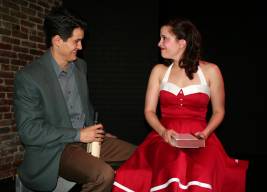
Emmy-winning writer JP Miller examines the devastation wrought by alcoholism on a young couple’s marriage in his best-known work, Days Of Wine And Roses, now being revived to powerful effect at Hollywood’s Lounge Theatre.
Although the title is likely to evoke either Blake Edwards’ 1962 film or its Oscar-winning Henry Mancini/Johnny Mercer title song, Days Of Wine And Roses debuted in 1958 as a 90-minute live TV broadcast on CBS’s Playhouse 90, making Miller’s unflinching look at alcohol addiction all the more remarkable for having been written during the Donna Reed/Father Knows Best 1950s.
What distinguishes Days Of Wine And Roses from some of its less successful “Disease Of The Week” TV movie counterparts is best expressed in the author’s note Miller wrote for his 1973 stage adaptation: “Days Of Wine And Roses is not a drunk story. It’s a love story. Drunkenness alone is ugly. But love can never be ugly. If a scene of drunkenness is played in a climate of love, it may be tragic, or it may be disgusting, but it can’t be ugly.”
The lovers Miller focuses on in Days Of Wine And Roses are Joe (Nathan Bell) and Kirsten (Tara Battani), a pair of 20somethings who meet cute at a business reception they are both attending, and despite banter that could just as easily be the prelude for a romantic comedy, seeds of the couple’s alcoholism are planted from the get-go when Joe asks the cocktail imbibing Kirsten “Where you storing that stuff?,” to which the object of his attention responds, “Hollow leg.” Funny … yet not so funny it soon turns out.
In short order, Kirsten has convinced Joe to quit his job as pimp PR man, after which the twosome hightail it away from the reception, the better to continue wetting their whistles out under the stars.
Love soon leads to both marriage and the baby carriage, and though Kirsten manages to stay off the booze while breastfeeding, Joe keeps on guzzling it down with clients, coming home smashed and surly and not at all happy to find his wife more interested in their daughter’s peaceful slumber than in tending to her drunk and disorderly husband’s needs.
Unfortunately, it doesn’t take long for things to go way downhill—way downhill—and not surprisingly, it is their now eight-year-old daughter who gets caught in the middle.
Then, when Joe has both literally and figuratively reached the bottom of the bottle, an angel arrives in the person of Jim Hungerford (Steve Gustafson), who introduces him to Alcoholics Anonymous, and the possibility of a new life—if only he can admit to being powerless over his addiction. As for Kirsten, well that may be another matter.
Playwright Miller understands well that there is no easy answer for his protagonist lovers, and one of the reasons that Days Of Wine And Roses remains powerful and relevant even half a century after its TV debut is its stubborn refusal to provide Joe and Kirsten (or the audience) with the facile answers and fairy tale ending a 1950s audience might likely have expected.
Notwithstanding its power and relevance, Days Of Wine And Roses does have its faults as a stage play, primarily a result of Miller’s decision to tell Joe and Kirsten’s story in flashbacks, with Joe recounting his tale of woe at an AA meeting four months into his recovery. Not only does this spoil the surprise element of discovering Joe and Kirsten’s alcohol addiction on our own, it requires a number of instantaneous scene changes between present and past and back again, easily achieved on film but nigh-on impossible on stage, particularly in a matchbox-sized black box space where actors are required to move furniture on and off each and every time we flash back or forward again. (Director John Frankenheimer cheated solved this problem in the live telecast by taping the Alcoholics Anonymous scenes on the day prior to the live telecast.)
Despite its flaws, Days Of Wine And Roses works, and not merely because of Miller’s still compelling writing.
Director Rebecca Hayes wisely places her focus on eliciting authentic, nuanced performances from her cast, and on this she is rewarded by terrific work all around, particularly from her two stars.
With their boy-and-girl-next-door good looks and charm, both Bell and Battani would seem to be romcom-ready, a particularly savvy bit of casting since we need to love Joe and Kirsten from the moment we first see them, the better to root for them even as we recoil from their drunkenness. In less sympathetic hands, we might not become invested in the couple’s recoveries, or simply choose to wash our hands of them. With Bell and Battani center stage, we stay on both their sides up to the final curtain. Both stars excel at one of an actor’s greatest challenges—playing drunk, and not simply playing drunk, but playing varying degrees of drunkenness. At this and throughout, both are absolutely believable, and Battani in particular simply breaks our hearts.
Topnotch support is provided by Phil Crowley as Kirsten’s despairing father Ellis, Zoe Rae Calamar as plucky Debbie, and Gustafson as Joe’s caring AA mentor. Numerous supporting characters are brought to distinctive life by the excellent duo of Michael Dye and Angela Stevens-Stark.
Technical director Steve Gustafson keeps scenic design to a minimum of furniture and props, which cast members move about as swiftly as humanly possible. Leticia Gonzalez’s first-rate lighting design complements and enhances scenic design choices. Crowley’s sound design provides a musical underscoring that is mostly quite effective at adding to the play’s poignancy, but would be more so if not quite so non-stop. Gonzalez doubles as stage manager.
A couple of props don’t work—a newspaper with anachronistic color photos and books whose wear and tear belie the care Kirsten has supposedly taken of them. Also, in one scene either Joe or Kirsten (I don’t recall which) carries on a rather lengthy conversation with an offstage voice. Was this supposed to be a voice on an intercom? Someone in an adjoining office? I couldn’t figure out why the actor wasn’t on stage.
Produced by Hayes, Days Of Wine And Roses was first performed by Bell, Battani, and their castmates last summer as a limited-run Bonus Production at Hollywood’s Actors Co-op. The decision to remount it at the Lounge proves an astute one, opening the production to reviewers and to the likelihood of reaching a larger audience. Despite its clunky construction, JP Miller’s Days Of Wine And Rose remains every bit as powerful and impactful as it was back in the black-and-white TV ‘50s. Trust me. It will leave you raw.
Lounge Theatre, 6201 Santa Monica Boulevard. Hollywood.
www.plays411.com/wineandroses
–Steven Stanley
January 15, 2012






 Since 2007, Steven Stanley's StageSceneLA.com has spotlighted the best in Southern California theater via reviews, interviews, and its annual StageSceneLA Scenies.
Since 2007, Steven Stanley's StageSceneLA.com has spotlighted the best in Southern California theater via reviews, interviews, and its annual StageSceneLA Scenies.







 COPYRIGHT 2024 STEVEN STANLEY :: DESIGN BY
COPYRIGHT 2024 STEVEN STANLEY :: DESIGN BY